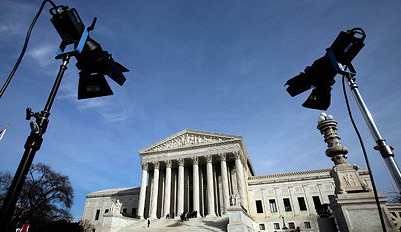The Supreme Court will soon hear oral arguments in King v. Burwell, in which conservatives will argue that the text of Obamacare limits federal subsidies only to people who buy insurance from state-run exchanges, not from the federal exchange. Roughly speaking, there are two prongs of the conservative argument:
- The law contains text that explicitly limits subsidies to state-run exchanges. Democrats may not have intended this, but they screwed up in the rush to get the bill passed. That’s too bad for them, but the law is the law.
- Democrats actually did intend to limit subsidies to state-run exchanges. This
 was meant as an incentive for states to run their own exchanges rather than punting the job to the feds.
was meant as an incentive for states to run their own exchanges rather than punting the job to the feds.
The argument over #1 revolves around textual interpretation of the statute as a whole, as well as previous Supreme Court precedent that provides federal agencies with broad latitude in how they implement regulations. The argument over #2 relies on trying to find evidence that limiting subsidies really was a topic of discussion at some point during the debate over the bill. That’s been tough: virtually no one who covered the debate (including me) remembers so much as a hint of anything like this popping up. The subsidies were always meant to be universal.
But the recollections of journalists aren’t really very germane to a Supreme Court case. The real-time analyses of the Congressional Budget Office, however, might be. This is an agency of Congress, after all, that responds to questions and requests from all members, both Democrats and Republicans. So did CBO ever model any of its cost or budget projections based on the idea that subsidies might not be available in certain states? Today Sarah Kliff points us to Theda Skocpol, who took a look at every single CBO analysis of Obamacare done in 2009 and early 2010. Here’s what she found:
CBO mostly dealt with overall budgetary issues of spending, costs, and deficits — or looked at the specific impact of health reform proposals on Medicare beneficiaries, health care providers, and citizens at various income levels. The record shows that no one from either party asked CBO to analyze or project subsidies available to people in some states but not others. In a June 2009 analysis of a draft proposal from Democrats in the Senate Health, Education, and Labor Committee, CBO treated subsidies as phased in. But even that proposal, which did not survive in further deliberations, stipulated that subsidies would be available in all states from 2014 — and CBO calculated costs accordingly.
After the Affordable Care Act became law in March 2010, members of Congress, especially Republican critics, continued to raise issues. In its responses, CBO continued to model exchange subsidies as available nationwide. No one in either party objected or asked for alternative estimations assuming partial subsidies at any point in the 111th Congress.
It’s unclear whether this is something the Supreme Court will find germane, but it’s certainly closer to being germane than the recollections of a bunch of reporters.
It’s also possible, of course, that the court will focus solely on argument #1 and never even get to questions about the intent of Congress. Nonetheless, this is an interesting review of the CBO record. The conservative case that Democrats actively intended subsidies to be limited to state exchanges has always been remarkably flimsy. Skocpol’s review exposes it as all but nonexistent.














